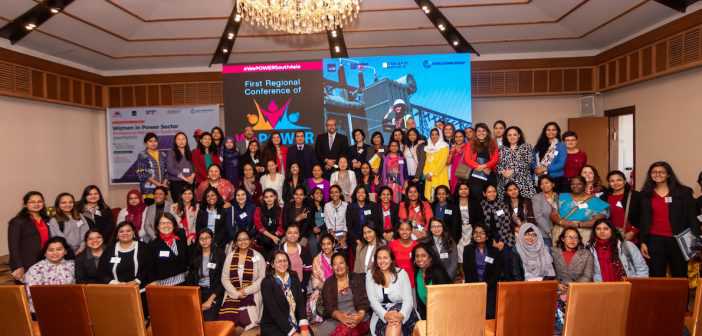'Bangladesh needs to address the widening monetary gap and toxic politics'

https://www.borgenmagazine.com/wepower-network/
For many women moving into South Asia, access to safe, clean energy sources is a daily challenge. To greatly help ladies escape this strength poverty, a new initiative from the Globe Bank is attempting to bring more ladies into the power sector. The program is named the WePOWER network, and the South Asia Strength and Social Development Product of the Environment Bank released it in February 2018.
About the WePOWER Network
By September 2020, the WePOWER network at this moment has 24 partners, which include 13 energy companies found in South Asia, according to Maria Beatriz Orlando, Business lead Social Development Specialist for WePOWER, within an interview with The Borgen Project. In the span of 1 year - from February 2019 to February 2020 - WePOWER partners directly impacted 10,836 women and young girls through recruitment, mentorship programs, STEM education outreach, and professional development workshops.
The WePOWER network has even higher goals for 2020, comprising 1,300 activities which will benefit over 20,000 women and girls. WePOWER is particularly trying to integrate girls into the strength sector because women typically employ energy services in family members.
“Where girls undertake the disproportionate show of time-intensive household work such as cooking, cleaning and collecting petrol, they stand to benefit more from household energy access,” stated Romy Listo, Ph.D. Candidate and member of the Energy & Poverty Exploration Group at The University of Queensland, Australia, within an interview with The Borgen Project.
Despite the fact that women are the most frequent beneficiaries of energy sector products, men still dominate the industry all over the world. “There’s a disjuncture between who home energy has rewards for and impacts on, and who accounts for the firms and utilities featuring it, and profiting from it,” Listo said.
How WePower is Supporting Women in the Energy Sector in South Asia
WePOWER supports women throughout South Asia, including partnerships with strength companies found in Bangladesh, Pakistan, Afghanistan, and India, among various other countries. It is important to teach women about the energy sector, which they reap the benefits of, day-to-day. However, additionally, it is critical to social development that girls have tangible impacts upon this sector. “Hiring and regarding women in technical work such as for example engineering positions in energy companies, challenge the social norms that women’s functions are in care do the job, or in the home and that may have an effect across contemporary society,” Listo said.
Ladies in STEM and the strength sector not only benefit the average person women but also their entire households and communities. Ladies have a tendency to “reinvest” 9% of their income to their family and the neighborhood community compared to a 30% to 40% fee of reinvestment from men, according to ENERGIA, a global network on gender and sustainable energy, committed to women’s economical empowerment and insurance plan influencing.
A diverse workforce also bolsters the economy, simply by boosting productivity and efficiency. The South Asian energy sector is normally a burgeoning market, and “the sector’s development and modernization need the involvement of major females talent,” Orlando said.
Despite the success of the WePOWER network up to now, further integration of females into the energy sector isn't without its challenges. The energy sector - like the majority of STEM professions - is dominated by males, as a result of social barriers and norms which prohibit females from excelling in these fields, Listo said. These obstacles include sexual harassment, expectations for ladies to activate in unpaid work at home, and unequal pay.
Partnership with Bangladesh Rural Electrification Board (BREB)
One of WePOWER’s latest partnerships is with Bangladesh Rural Electrification Board (BREB), which serves 28 million persons in the country, and energy to almost all of rural Bangladesh. BREB features 30,000 employees with around 5,000 female staff, including nine feminine deputy general managers, relating to Orlando. Although Bangladesh possesses made strides to increase its female work force participation, only 36% of its labor force is feminine, which is “still considered too low,” by the World Bank’s standards, Orlando said.
However, since BREB became a member of the power network, the rate of female employee participation offers increased by 10% through recruitment, pensions and other rewards. “My colleagues and Personally I think motivated and empowered by the possibility to serve our region - a bright and shining Bangladesh,” Ivy Nahar Tisha, an assistant engineer with the BREB, said within an interview with the Environment Bank.
As one of WePOWER’s initiatives, Tisha helped create a daycare center at the BREB’s headquarters, lessening the burden on moms in the workforce. However, as a result of the COVID-19 pandemic, people around the world will be transitioning to working from home. This creates a completely new group of obstacles for ladies in the workforce, like finding the balance between work and domestic expectations.
As a result, in-may 2020, WePOWER hosted a virtual discussion titled “COVID-19 and its own Impact on Ladies Professionals in the Strength Sector,” which focused on how the organization needs to adapt through the pandemic to best serve its feminine constituents.
The We POWER network will continue to empower and advocate for women in the energy sector and work to combat energy poverty - even amidst the new challenges that the pandemic poses.
Source: https://www.borgenmagazine.com
Tags :
Previous Story
- Why building financial bridges in the neighbourhood matters
- Bangladesh’s growth stems from political stability
- Asian Economies Set to Dominate 7% Growth Club...
- Economy key to ease Indo-Pak ties: South Asian...
- Juniper Networks to bring comprehensive digital security system...
- Govt conducts 5G trial run
- Stronger investment in children sought